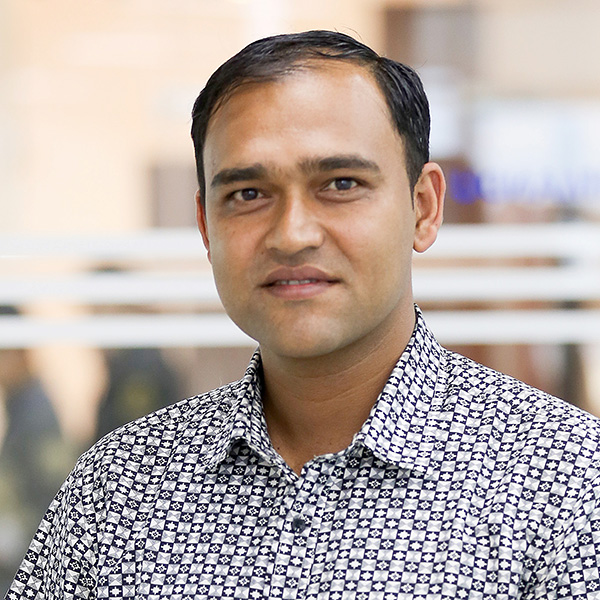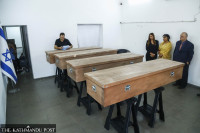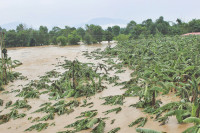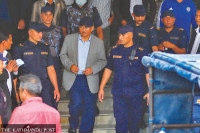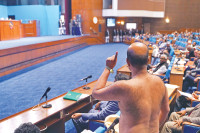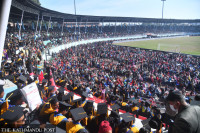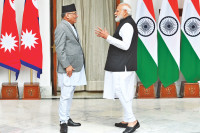Special Supplement
How Nepal is gambling to make it big in the next South Asian Games without any preparation
With the 13th SAG looming, Nepal looks to capitalise on its home advantage to increase gold-medal haul.
Prajwal Oli
Amid concerns of its ability to host the biannual event in 2019, Nepal still expects taekwondo and karate to deliver better results from at least last edition (2016) in India, where it could only claim three gold medals. Nepal was billed as the martial arts powerhouse ever since it struck 28 gold medals—14 each in karate and taekwondo—during the 1999 Games on home soil. It was the same year, eighth edition, both taekwondo and karate made debuts in the south asian meet as Nepal finished second with 31 gold behind the undisputed table-topper India, who struck 102 gold.
Coming into the last edition in 2016, the aura of dominance had deserted with Nepal unable to clinch a single medal in taekwondo, while karate was excluded owing to the internal infighting in Indian Karate Association. Men’s football team, wushuka Nima Gharti Magar and judoka Phupu Lhamu Khatri saved the Nepali blushes with three gold medals. To add to the misery Nepal finished in sixth place, its worst ever position since the Games’ inception in 1984 in Kathmandu.
In the next three editions after 1999, it was taekwondo and karate which gave Nepal the majority of the gold medals. In the 9th SAG in Islamabad, Nepal grabbed seven gold with taekwondo accounting for six and karate clinching another. Nepal won seven gold in 2006 in Colombo with taekwondo and karate providing four titles: two gold each.
Karate (3) and taekwondo (2) again gave Nepal five of the eight gold medals Nepal struck in 2010 in Dhaka. Nepal now hopes to put aside the 2016 disappointment behind it and make the most of the home advantage count. And to make that happen it once again has to rely on the two most successful disciplines that have fetched Nepal a total of 44 gold medals –24 in taekwondo and 20 in karate. The contribution of taekwondo and karate in terms of delivering medals is remarkable considering that Nepal has so far won a total of just 71 gold medals in the South Asian regional meet.
Nepal Taekwondo Association (NTA) president Prakash Sumsher Rana said that it would be misleading if he claims Nepal would emulate the 1999 achievement. “We could still fare far better than in the past few editions, but considering to repeat the 1999 feat would be farce. Back then, it was Nepal which introduced taekwondo in South Asia. We conducted training in Bhutan, Bangladesh and Pakistan leading up to the Games and it was natural for us to collect bigger share of titles,” added Rana. Of the 16 gold on offer, Nepal claimed 14 while losing in the finals of the other two events.
“But we can still look for eight to 10 gold medals provided we do not get distracted in our preparations from any sort of political interference or disruption,” said Rana citing National Sports Council’s recent directives which has called on NTA to take a parallel taekwondo association on board. “We don’t want any distraction. Currently we are working on sending our players for training to Thailand,” said Rana.

Record four-time SAG taekwondo gold medalist and national team coach Deepak Bista said the training of top-notch players started in late November. Bista, however, accepted the fact that their South Asian opponents have made huge strides since 1999. “It’s not possible to match the success of 1999. Realistically we can still earn significant medals given that we start proper and scientific training in conducive environment,” added Bista. “The home advantage will count for sure but players, coaches and management must have common goal. Players need to get enough international exposure in the lead up to the Games,” said Bista.
Deepak Shrestha, the 1999 SAG karate gold medalist and national karate coach, expressed utter dissatisfaction over training regime and lack of coordination among the stakeholders. “As the host, it is natural to have high expectations. But preparations must be made to match the success of 1999,” said Shrestha.
“Karatekas sat idle since the Asian Games in Indonesia and resumed training only from December 11 thanks to the personal initiation from chief coach Sovit Prasain,” said Shrestha. “Training among ourselves won’t be enough, we need proper international exposure to stake claims for multiple gold medals. Indifference of the sports governing body—the National Sports Council—and the association will ultimately cost Nepal dear. Continuing with the way we are moving right now, we can best land two golds in SAG,” said Shrestha.
National player and 2010 SAG karate bronze medalist Parshu Ram Bastola said Nepal needs long-term and systematic training to achieve better results. “We have a tendency to start preparations at the last hours, few months before the Games. The concerned authorities must understand that training alone won’t help. Players need international exposure to get the feel of a match-situation before gearing up for important meets like SAG,” said Bastola.
Arjun BK, Chief of Training Department at the National Sports Council (NSC), said most of the prominent national team athletes were under some kind of training for over two years leading up to the Asian Games in Indonesia in August and September this year. “The training was discontinued after the Indonesia Games with a view of picking fresh players from the 8th National Games scheduled for mid December,” said BK.
But since the National Games was postponed for February next year, BK said they will resume the proper training immediately after that. BK added NSC had already picked up 43 players from 13 sports disciplines for Special Training. “Players for the special training began on the basis of their performance in the Asian Games. Additional preparations will be done after completion of the National Games.”
Despite talks of preparations, Nepal is racing against time to host the SAG for the third time in its history. The bi-annual multi-event Games, originally scheduled for this year, has already been pushed back three times—partly because of the damage inflicted on the existing sporting infrastructure by the 2015 earthquake and largely due to the snail-paced development of the new and existing sporting facilities. The games’ management committee, headed by Sports Minister Jagat Sunwar, has proposed a new date: September 2019.
NSC Member Secretary Keshav Bista has his own grievances: the budget crunch. “We require Rs 7 billion for sports equipment and team preparations. But the Ministry of Finance has not allocated single penny on the topic. Releasing funds a couple of months before the Games will do no good as it will deprive athletes from proper training and preparations,” said Bista.
Putting aside doubts of Nepal’s ability to successful ly pull off the biannual event next year, it will definitely be taekwondo and karate which will take the centre stage at the 13th SAG. Given the remarkable success the two sports have in the history of the Games, it will be suicidal for the sports governing body to show any kind of indifference towards its players and the associations. The NSC should immediately start investing in sports that have better prospect of providing medals. In earnest, taekwondo and karate are two of the the very few disciplines that the NSC should focus on.




 9.7°C Kathmandu
9.7°C Kathmandu